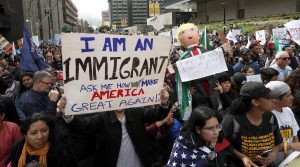Washington, Mar 9 (EFE).- Several states, including Washington, Oregon and New York, on Thursday announced that they will join Hawaii in filing lawsuits against President Donald Trump’s new immigration order prohibiting US entry to citizens of six Muslim-majority nations and suspending the refugee entry program.
“It’s my duty, my responsibility to act. We’re not going to be bullied by threats and actions by the federal government. (Trump) cannot unilaterally declare himself free of the court’s restraining order and injunction,” said Washington state Attorney General Bob Ferguson.

That state, accompanied by Minnesota, managed to win a legal challenge against – and thus block – Trump’s initial executive order on immigration, signed on Jan. 27 and against which the San Francisco-based 9th Circuit Court of Appeals ruled.
For now, four states – Washington, Oregon, New York and Minnesota – have said that they will join Hawaii in the fight against Trump’s immigration ban, although the attorneys general of these four states, all of which are governed by Democrats, have not specified if other local entities will become party to the legal actions.
At a press conference, Ferguson said that he will direct his motion to U.S. District Court Judge James Robart and ask him to reaffirm that his previous order issued on Feb. 3 blocking Trump’s original travel ban applies to the new version as well.
Meanwhile, New York AG Eric T. Schneiderman said in a statement that he and Minnesota AG Lori Swanson will join the lawsuit that the Washington official will file in that state.
“President Trump’s latest executive order is a Muslim ban by another name, imposing policies and protocols that once again violate the Equal Protection Clause and Establishment Clause of the United States Constitution,” Schneiderman said in a statement.
When the four states file their suits, Trump’s travel ban will be facing two parallel challenges: one in Honolulu and the other in Seattle.
The state of Hawaii filed the first lawsuit against the new immigration ban in a Honolulu federal court asking for a temporary suspension of the measure Trump signed on Monday, although it does not go into effect until March 16.

“Hawaii is special in that it has always been non-discriminatory in both its history and constitution,” Hawaii Attorney General Douglas Chin said. “Twenty percent of the people are foreign-born, 100,000 are non-citizens and 20 percent of the labor force is foreign-born.”
Everybody wants security, but discriminating against people because of their nationality or religion must not occur, and the new order does not correct the defects of the original travel ban, Chin said.
Hawaii claims that the changes introduced by Trump to the first travel ban blocked by the courts in early February do not modify the basic nature of the measure, which – in its judgment – continues to be unconstitutional.
The new immigration ban suspends for 120 days the refugee acceptance program and bars for 90 days US entry for citizens from Iran, Somalia, Sudan, Syria, Yemen and Libya, taking the stance that they present a terrorism risk.
In contrast to the first executive order, the new measure exempts citizens of Iraq and those enjoying permanent US residence.
It also eliminates the ongoing prohibition on entry for Syrian refugees and the exemption of Syrian Christians from the ban.
The executive order signed by the president also reduces from 110,000 to 50,000 the number of refugees the US will take in during 2017.
